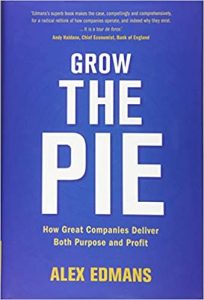
Book: Grow the Pie
The book, ‘Grow the Pie, by London Business School Professor of Finance Alex Edmans, sets apart the concept of ‘growing the pie’ from the notion of ‘splitting the pie’. The latter suggests that anything a company gives to stakeholders such as increased wages, price reduction, or a better treatment of the environment lowers company profit. A ‘splitting the pie’ approach results in friction, and a trade-off focus. An alternative is the ‘grow the pie’ approach. The main idea is that if companies deliver value to stakeholders, this will actually benefit investors.











